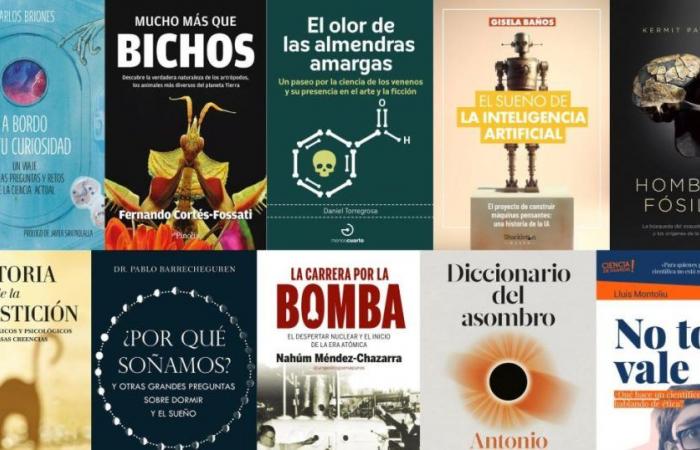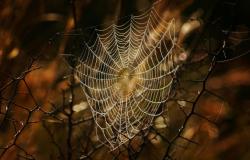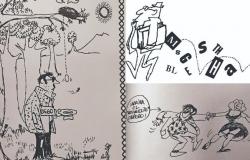In recent yearsscientific dissemination has experienced a notable boom in Spainto. This growth is not only reflected in the number of publications, but also in the quality and diversity of the topics addressed. Curiosity about knowledge and science has sparked the interest of an increasingly broad audience, from young students to adults eager to better understand the world around them. This trend has been reinforced by the growing need for accurate and accessible scientific information, especially in a context where science plays a crucial role in society, as we have seen during the COVID-19 pandemic. Scientific dissemination is not only limited to traditional topics, but expands to new frontiers, including artificial intelligence, scientific ethics and molecular biology. In this vibrant context, The editorial offer is enriched with works that invite reflection and discoverywhich are key tools to promote a solid and participatory scientific culture.
We already gave you a list of 10 books to give as gifts for Three Kings, you still had homework left. In the meantime, we give you 10 new ideas, but there are many more!
1. On board your curiosity, Carlos Briones
On board your curiosity, Carlos Briones
On board your curiosity (Criticism, 2024) is a book by the chemist Carlos Briones prefaced by the popularizer Javier Santaolalla. What was the origin of everything? Can we travel in time? What is life? Could there be other lives in the Universe? And many other questions that you may have asked yourself and not been able to answer. The book has 52 chapters, one per week. All in a context of scientific rigor and critical spirit.
2. Bugs, Fernando Cortés-Fossati
Bugs
Bugs (Pinolia, 2024) is the entomologist’s debut work Fernando Cortés-Fossati. In this book the author reminds us that what we understand by “bugs” are really Arthropods. An exciting journey through this group and how it affects us human beings. Written in an informative and accessible language, with curious facts that leave no one indifferent.
3. The smell of bitter almonds, Daniel Torregrosa
The smell of bitter almonds
The smell of bitter almonds (Menoscuarto, 2024) is the new book by the popularizer Daniel Torregrosa. The title, with a literary reference, takes us into the theme of the book: poisons. This is a pleasant and entertaining tour of poisons throughout history. If it is something that is not a poison, it is reading, and especially not this exciting book.
4. The dream of artificial intelligence, Gisela Baños
The dream of artificial intelligence
The dream of artificial intelligence (Shackleton Books, 20024) Gisela Baños It is a necessary book in these times. The author, an expert in the field, tells us about Ada Lovelace, Turing and even ChatGPT. A whole list of milestones and important moments in the history of artificial intelligence. And, of course, it invites us to what remains to come.
5. Fossil Men, Kermit Pattison
fossil men
fossil men (Capitán Swing, 2004) is the Spanish title of a book by the American journalist Kermit Pattison. In 1994, a team led by renowned paleontologist Tim White discovered the skeleton of Ardipithecus ramidus (“Ardi”), 4.4 million years old, which challenged key theories about human evolution. A discovery and consequences that are recounted in this book.
6. History of superstition, Aníbal Bueno
History of superstition
History of superstition (Pinolia, 2024) is written by the biologist and tribal specialist Hannibal Good. Although much of the book is more historical and cultural, it contains some first chapters focused on the psychological vision of superstition. And, by the way, he talks about fallacies of all kinds, a fundamental concept to take into account in the scientific world.
7. Why do we dream?, Pablo Barrecheguren
Why do we dream?
Why do we dream? (Plataforma Actual, 2024) is the new work of the neuroscientist Pablo Barrecheguren, also known for his videos and monologues. It is a question that we have asked ourselves at some point, no matter how old we are. The author explains the importance of sleep and what the consequences of lack of sleep are.
8. The race for the bomb, Nahúm Méndez
The race for the bomb
The race for the bomb (Pinolia, 2024) is the new book by Nahum Mendez, a geologist who has great informative skills. In this work we can discover how the discovery of uranium and its way of treating it were fundamental for the creation of atomic bombs. A scientific and historical approach.
9. Dictionary of wonder, Antonio Martínez Ron
Dictionary of wonder
Dictionary of wonder (Criticism, 2023) by the experienced science journalist Antonio Martínez Ron It is precisely what it advertises, a true dictionary. A calm and close list of scientific terms of all types. Clone, supernova, robot, etc. But it goes far beyond a simple dictionary: it takes us into the history of science and how it has become an engine of language.
10. Not everything goes, Lluis Montoliu
Not everything goes
Not everything goes (Next Door, 2024) is a new book, among many, by the renowned biologist Lluis Montoliu. On this occasion, a topic that is rarely addressed in scientific dissemination, although of extreme importance, is addressed: ethics in science. The author embarks on a journey through good and bad practices in scientific dissemination and will make us reflect as, perhaps, we have never done before.






